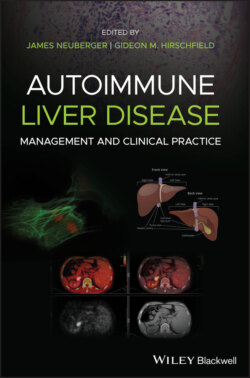Читать книгу Autoimmune Liver Disease - Группа авторов - Страница 20
Carbohydrate Metabolism
ОглавлениеThe liver plays a key role in carbohydrate metabolism. It maintains carbohydrate stores by synthesizing glycogen and generating glucose from precursors such as lactate, pyruvate, and amino acids. Glycogen stored in the liver is the main source of rapidly available glucose for the whole organism. In the fed state, glycogen synthesis occurs preferentially in the perivenous hepatocytes whereas in the fasting state, glucose release via glycogenolysis and gluconeogenesis initially occurs in periportal hepatocytes. The liver glycogen stores contain up to a 2‐day supply of glucose, after which glucogenesis occurs mainly from lactate. In acute liver failure, the blood glucose level may drop whereas this is infrequent in chronic liver disease, where it is more common to observe hyperglycemia and insulin resistance. This may be related to decreased glucose uptake by muscle and reduced glycogen storage in the liver and muscle.
